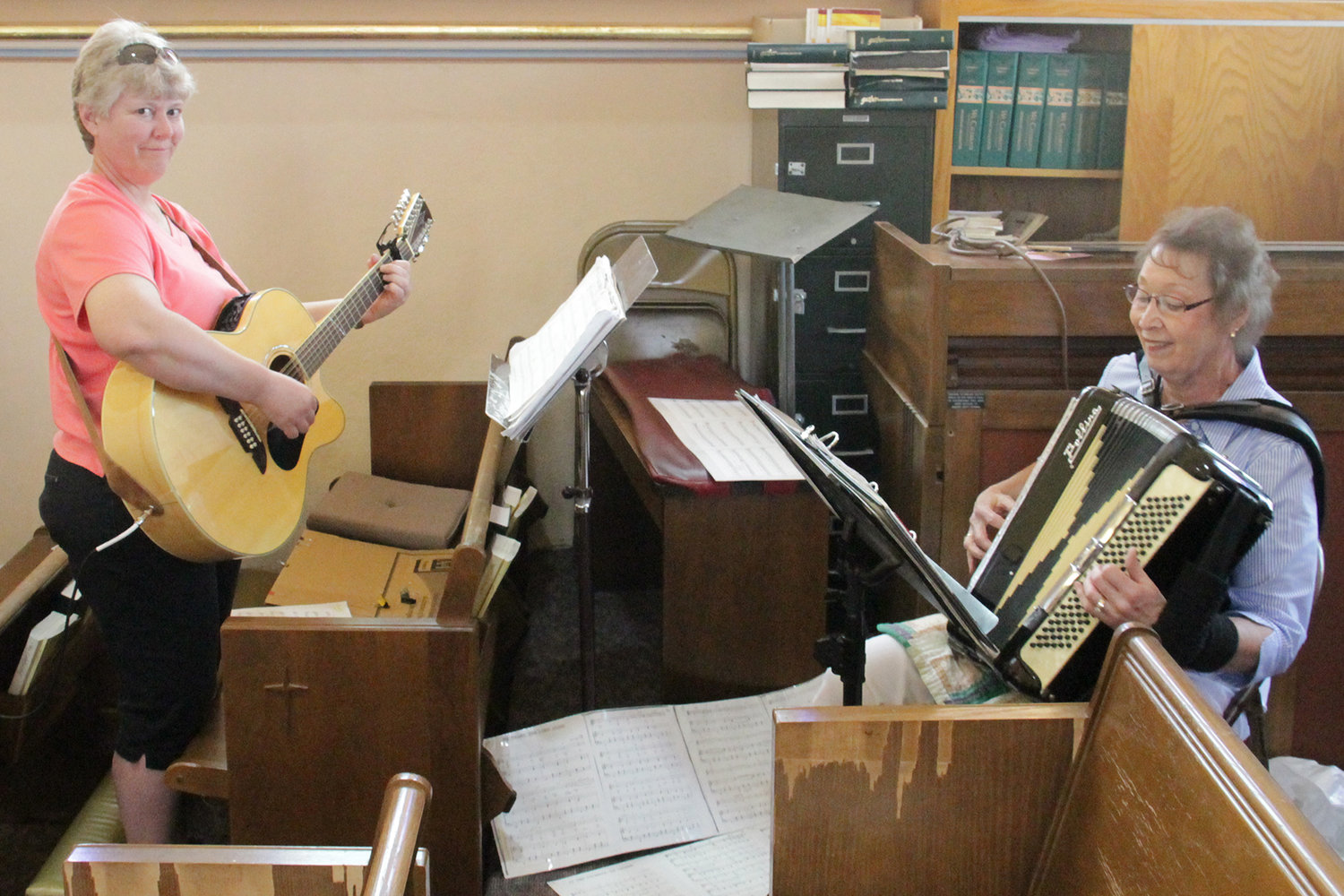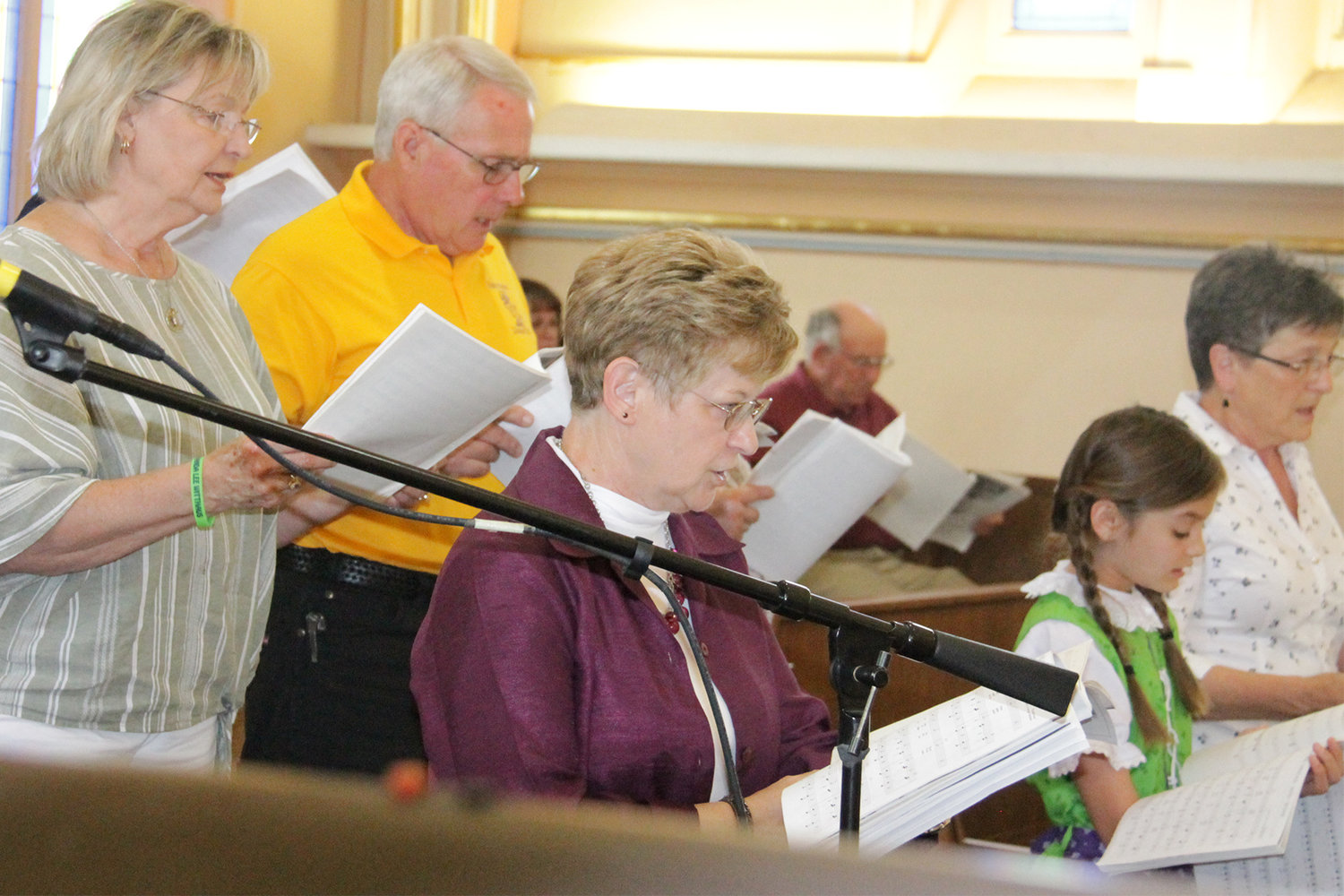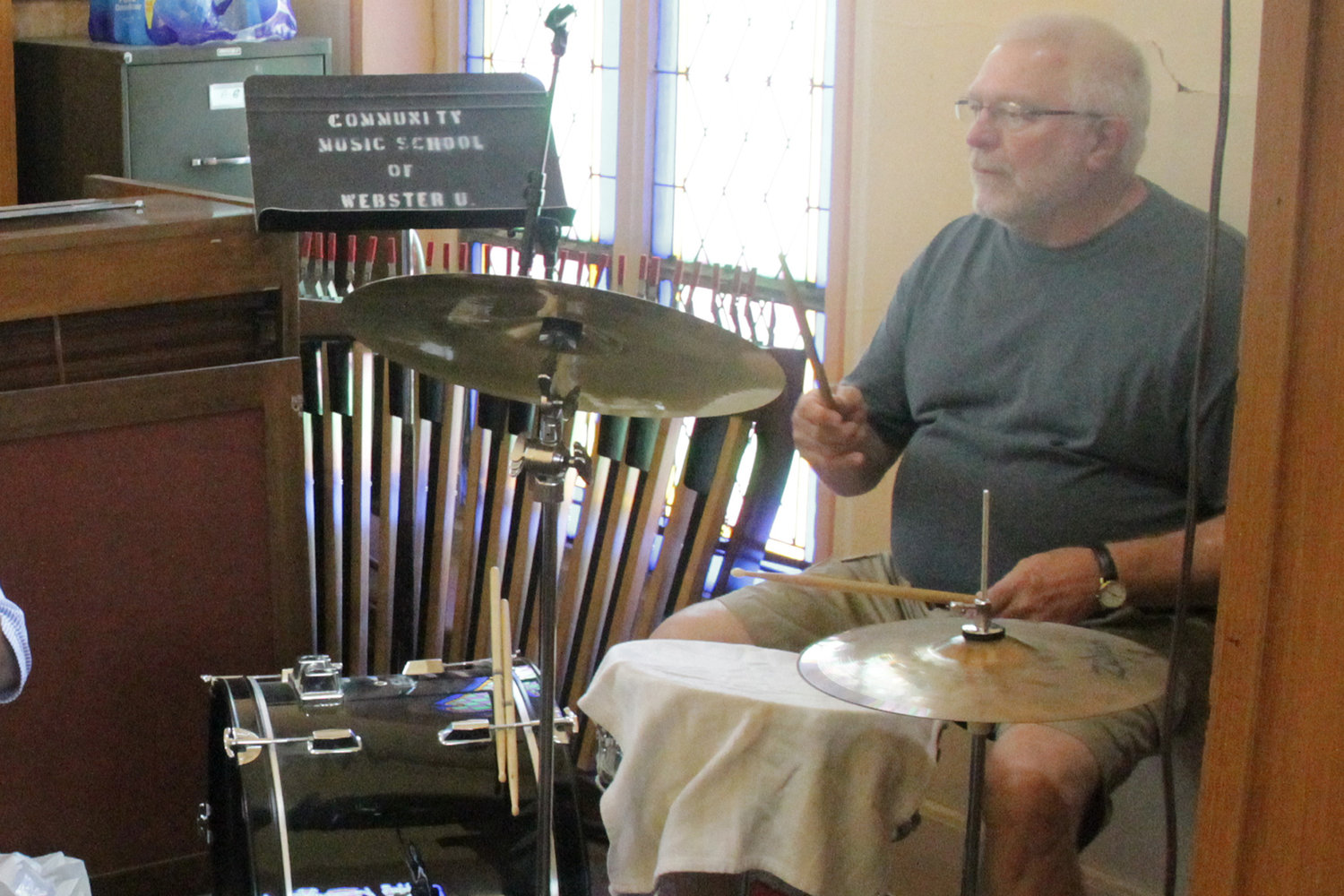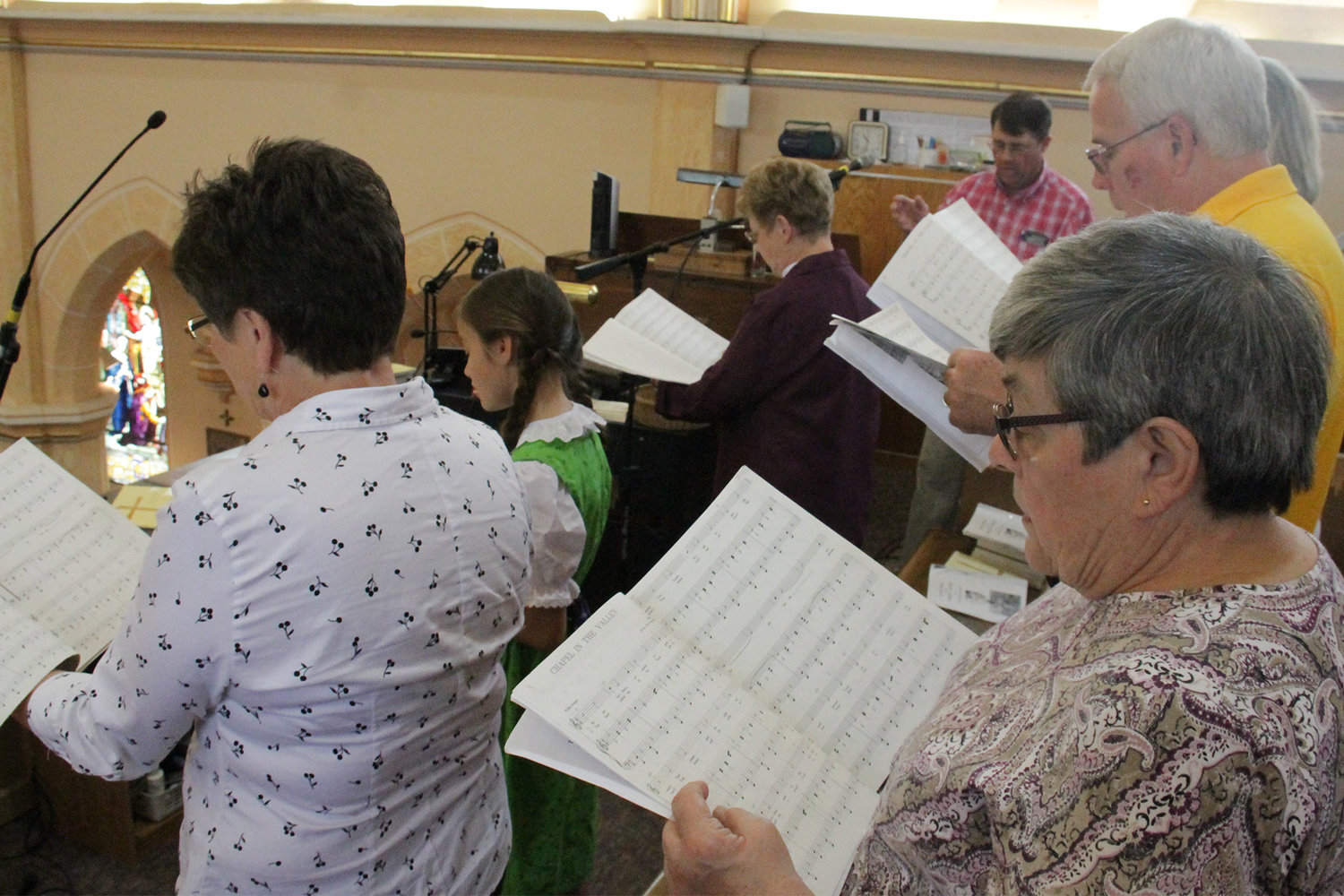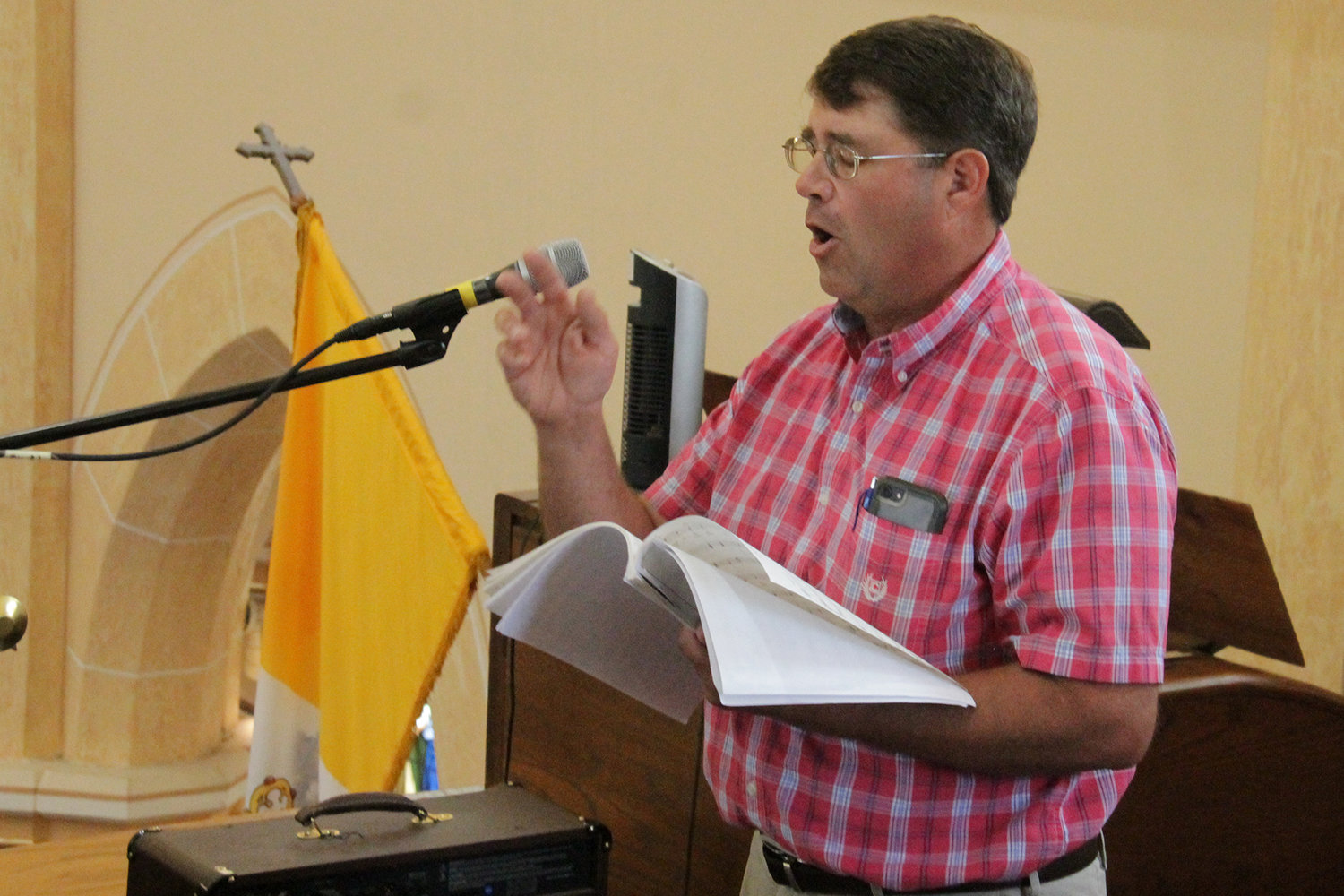Polka Mass tradition continues at St. George in Hermann

“Jesus, we’re not worthy ever, to receive You here today. Say the word, denying never. Make us pure again, we pray.”
Plaintive stanzas of contrition and thanksgiving envelop the altar of a hilltop church in Hermann.
Then it hits you: this is “Blue Eyes Crying in the Rain!”
The lovesick ballad, recast with pious lyrics and a Slavic tempo, seems right at home in this place of grace, where generations of plainspoken immigrants once knelt in worship and sought redemption.
Before the final blessing, the people will have tapped their toes to an array of folk compositions, ranging from the jovial “Let the Son Shine In” to the haunting “Beloved Mother” — a translated Polish Marian hymn reported to have brought tears to Pope St. John Paul II’s eyes.
They will have responded to the principal parts of the Mass in cadences reminiscent of festivals and firesides of Northern Europe and the prairie frontiers of the American Midwest.
This is what’s known as a Polka Mass, and it will be celebrated with requisite joy and reverence at 10:30 a.m. on Sunday, Oct. 13, in St. George Church, 128 W. Fourth St.
All are invited to take part in the Mass, which coincides with the Hermann Oktoberfest and the parish’s annual Smorgasbord.
Sing to the Lord
The Polka Mass is an uplifting celebration.
The happy-spirited slate of hymns and spirituals in the polka style encourages active worship and full participation from the congregation.
“It’s really an upbeat Mass with really beautiful music and lyrics,” said St. George parishioner Virginia Hall, who plays the accordion in the parish’s Polka Mass ensemble.
“It’s very fitting in our area,” she said. “We do have a strong German heritage. Polka music is the background music for a lot of our festivals here.”
The music ensemble also consists of Sherri Gerlemann on guitar and Larry Landolt on drums.
The parish choir, directed by Tim Engemann, leads the singing.
All the portions of the Mass that can be sung — “Lord Have Mercy,” “Gloria,” “Alleluia,” “Holy, Holy, Holy,” and the “Lamb of God”— are set to polka-style music.
Polka hymns are sung throughout.
The choir and ensemble will also play for about 10 minutes before the Mass begins.
“I think it’s become a tradition here,” Mrs. Hall said. “People wait to see what Masses we’re going to play at, and plan to attend because they enjoy them.”
“Unique mode”
“The Polka Mass,” explains the liner notes of a record titled “Songs and Hymns from the Polka Mass,” “consists of the same basic worship service celebrated in the Roman Catholic tradition but utilizing a unique mode of music.
“Folk music, cherished by generations of Slovenian and Croatian people, has been specially arranged and adapted with hymn lyrics in English.
“These old ethnic melodies are presented in the polka and waltz stylings ... and are sung in reverence by the congregation and the choraleers.
“The result is a joyous, inspiring worship service with the most unusual music and orchestration presented in a manner of dignity which enhances the solemnity of the Mass.”
Father George Balasko celebrated the first known Polka Mass in the United States in 1972, in Lowellville, Ohio, with Bob Timko orchestra.
The late Father Frank Perkovich presided at the second Polka Mass in the United States, at the Resurrection Church in Eveleth, Minnesota, on May 5, 1973, accompanied by Joe Cvek and the Variable Orchestra (later known as the Polka Masters).
From that ensemble came most of the music that will be used for the Mass in Hermann.
Strings and reeds
Mrs. Hall started taking accordion lessons at age 9 and played in a German accordion band as a teenager.
She kept playing through school and returned to Hermann in 1975 to work at the local hospital.
She still plays the original accordion her parents bought her in St. Louis when she was 11.
“Honestly, it never occurred to me to play an accordion in church,” she said. “But it’s amazing how well it works.”
More than 20 years ago, choir members Harold and Pearl Schaumberg, both now deceased, presented her a recording titled “Songs and Hymns from the Polka Mass.”
They encouraged her to learn the music.
Mrs. Hall recalled having heard a mariachi band play folk hymns at a church in San Antonio, Texas, which had piqued her interest in ethnic music at Mass.
She and parishioner Harold Kruse, who had been a member of a traditional German band and a Country-Western band, learned the chords and melodies and asked their pastor for permission to include the songs at Mass.
Franciscan Father Ambrose German, now deceased, gave his blessing, which led to the first Polka Mass at St. George.
The tradition continued through the pastorate of Father William Debo and now with Monsignor Gregory L. Higley as pastor.
From miles around
Polka Masses are celebrated at the parish once during Hermann’s Oktoberfest and again during Maifest (the third weekend in May).
People come from all over to spend the day at these community celebrations with their abundance of traditional German music.
“Starting their day off at Mass with us helps put them in the mood for all of that,” said Mr. Engemann.
For a while, the polka ensemble would accompany Masses at several nearby parishes in the Jefferson City diocese and St. Louis archdiocese.
“We pretty much stay put these days,” said Mr. Engemann, “but we still get together two times a year at St. George.”
He recalled that a group of Cajun dancers from Louisiana used to arrive in Hermann each July and would come to Mass at St. George in their full Cajun dress.
“We would have the Polka Mass for them,” he said. “They filled the first six pews of the church. Some of them would even come back in October or at Christmas to visit.”
People of goodwill
Near the end of 2011, the ensemble hit a roadblock: The revised English translation of the parts of the Mass meant that many of the arrangements no longer matched the Mass parts.
Choir member Donna Hebb accepted the challenge of setting the new liturgical texts to the same kind of polka-sounding music.
“It was quite an undertaking,” said Mr. Engemann. “Thanks to her taking that upon herself, we can sing all of the Mass parts whenever we have the Polka Mass.”
Happy feeling in the air
The ensemble has taken to singing “Edelweiss,” a gentle piece from “The Sound of Music,” after Holy Communion.
While harmonizing the lyric, “Bless my homeland forever,” they pray for the United States as well as the countries from which their ancestors arrived.
Most members of the ensemble have their favorite song from the Polka Mass.
Mr. Engemann is partial to the rhapsodic “Under the Skies of Blue,” although the more jovial “Let the Son Shine In” seems to be most people’s favorite polka hymn.
“We sing that as a recessional,” he said. “You see them kind of kick-up their heels and move and start clapping.”
It was certainly the favorite of Pearl Schaumberg, who with her late husband Harold first introduced the Polka Mass to Mrs. Hall.
“They were both very adamant about continuing this tradition of the Polka Mass at St. George,” said Mr. Engeman.
When she died a few weeks ago, it was only natural for it to be sung at her funeral, he said.
Comments
Other items that may interest you
Services
The Catholic
Missourian
2207 W. Main St.
Jefferson City MO 65109-0914
(573) 635-9127
editor@diojeffcity.org

